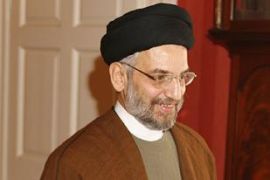Iraqi Shia leaders sign truce
Moqtada al-Sadr and Abdel Aziz al-Hakim agree deal aimed at ending years of rivalry.

A statement from al-Hakim’s office said Saturday’s accord mentioned three points aimed at “enhancing relations between the two groups and maintaining the Islamic and national interest.”
|
“Iraq is still under foreign occupation and Iraqis continue to die in great numbers” albaghawy, Luxembourg |
The remaining two points talked of uniting media and cultural efforts and setting up a joint committee with provincial branches to keep order between their respective supporters.
Liwa Sumaysim, head of the political committee of the Sadr group, said: “The agreement is essentially a commitment of honour. The most important aspect is that it forbids both sides to engage in bloodletting against each other and against Iraqis in general.”
Hamid al-Saadi, head of the SIIC media office, said the deal was agreed in a “friendly spirit” and came at an “important time for the country”.
“Iraq needs deals between factions in Iraq to enhance and preserve Iraqi unity,” al-Saadi said in a statement.
Government boycott
Both al-Sadr and al-Hakim hail from families that have been active in Iraq’s political and religious life for generations.
Sadr presents himself as a strong Iraqi nationalist while al-Hakim is seen as closer to Tehran, where he spent a number of years in exile during the rule of Saddam Hussein, the former Iraqi leader.
| “Iraq needs deals between factions in Iraq to enhance and preserve Iraqi unity” Hamid al-Saadi, head of the SIIC media office |
At the end of August, al-Sadr ordered his fighters to observe a six-month ceasefire, including a halt to attacks on US forces.
Despite his close ties with Iran, al-Hakim has tried to build bridges with Washington. Last year he met George Bush, the US president, at the White House.
The SIIC was founded in Tehran in 1982 as the Supreme Council for the Islamic Revolution in Iraq (Sciri).
The party returned to Iraq in the aftermath of the US-led invasion of March 2003.
Al-Hakim is believed to be in Iran, where he received treatment in May for a cancerous tumour. His son Ammar is considered his unofficial successor.